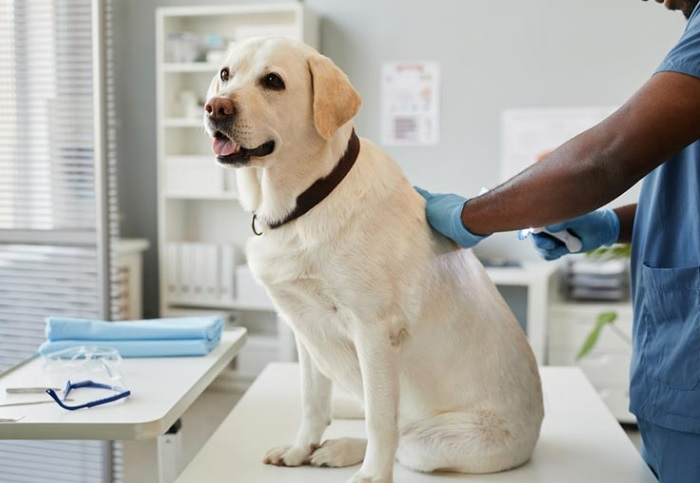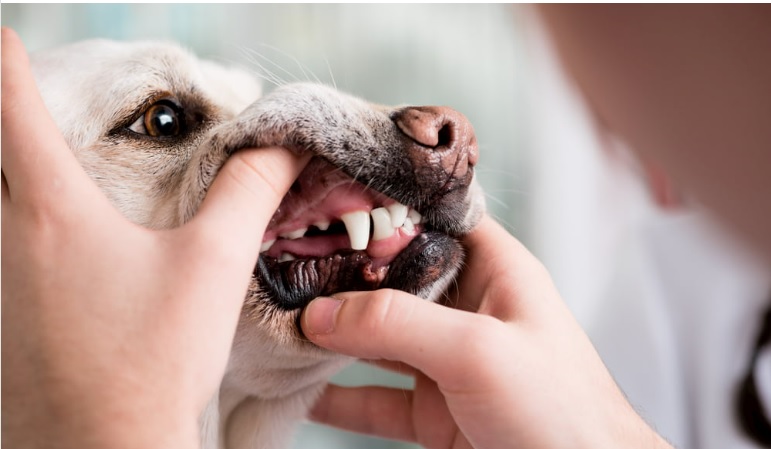Dog Coughing In the symphony of life, our dogs are like the precious notes that bring harmony to our existence. However, amidst this melodious symphony, an unexpected cough can disrupt the rhythm and cause concern for pet owners.

Just as a broken string on a violin can mar the beauty of a performance, a dog’s cough can be an indication of an underlying health issue that requires attention. Understanding why our beloved canine companions cough is crucial in order to provide them with proper care and support.
While some causes of coughing in dogs may be harmless and self-limiting, others could signify more serious conditions that demand medical intervention. Recognizing the symptoms associated with canine coughs is essential for prompt diagnosis and treatment.
This article will delve into the common causes of coughing in dogs, helping you decipher whether your furry friend’s cough warrants veterinary attention or if it can be managed at home. By shedding light on this topic, we aim to serve both you and your loyal companion by ensuring their well-being remains in tune with their vibrant spirit.
Key Takeaways
- Dogs coughing can be a sign of underlying health issues such as respiratory infections, allergies, heart disease, or foreign objects in the airways.
- Home remedies for dog coughing relief include humidifying the air, providing a warm and comfortable environment, ensuring proper hydration, and avoiding irritants.
- Veterinary attention is needed if a dog’s cough lasts more than a few days or if there are severe or worsening symptoms such as coughing up blood, difficulty breathing, or persistent fever.
- Treatment for canine cough may involve antibiotics, antitussive medications, rest, and hydration, depending on the underlying cause.
Common Causes of Dog Coughing
One of the most frequent reasons for a dog to cough is due to common causes such as respiratory infections, allergies, heart disease, or foreign objects in the airways.
These causes can lead to chronic coughing in dogs, which can be distressing for both the pet and their owner.

Respiratory infections, such as kennel cough or pneumonia, are often caused by viruses or bacteria and can result in a persistent cough.
Allergies to certain substances like pollen or dust mites may also trigger coughing in dogs.
Heart disease is another common cause of coughing, as it can lead to fluid accumulation in the lungs.
Additionally, foreign objects lodged in the airways can irritate and obstruct breathing, causing a dog to cough repeatedly.
While there are home remedies available for dog coughing relief, it is important to consult with a veterinarian for proper diagnosis and treatment options.
Recognizing the Symptoms
To identify the symptoms of canine cough, it is important to observe and recognize the signs exhibited by the animal. Dogs with a cough may display various symptoms that can help in determining the cause and severity of their condition. These symptoms include:

- Persistent coughing
- Gagging or retching movements
- Wheezing sounds during inhalation or exhalation
- Difficulty breathing
- Nasal discharge
- Lethargy
- Loss of appetite
- Fever
Recognizing these symptoms can aid in identifying potential triggers for your dog’s coughing episodes.
It is also beneficial to consider effective home remedies for dog coughing. Some common remedies include:
- Humidifying the air in your home
- Providing a warm and comfortable environment for your dog to rest in
- Ensuring proper hydration through increased water intake or broths
- Avoiding exposure to smoke or other irritants
By recognizing these symptoms and implementing appropriate remedies, you can help alleviate your dog’s coughing discomfort.
When to Seek Veterinary Attention
When a dog’s cough lasts more than a few days, it may be an indication of a more serious underlying condition. In such cases, it is important to seek veterinary attention to determine the cause of the prolonged cough and provide appropriate treatment.

Severe or worsening symptoms, such as persistent coughing up blood, difficulty breathing, or a persistent fever, also warrant immediate veterinary attention as they may indicate a potentially life-threatening condition that requires urgent medical intervention.
Cough Lasting More Than a Few Days
A persistent cough in dogs that lasts more than a few days may be indicative of an underlying respiratory infection, such as kennel cough, which is commonly caused by the Bordetella bronchiseptica bacterium. If a dog’s cough persists for an extended period, it is crucial to seek veterinary attention promptly.

Treatment for canine cough often involves addressing the underlying cause and managing symptoms. Veterinarians may prescribe antibiotics to combat bacterial infections or recommend antitussive medications to alleviate coughing. Additionally, supportive care such as rest and hydration can help speed up recovery.
While there are various home remedies for dog cough suggested online, it is important to consult with a veterinarian before attempting any treatment at home. Seeking professional advice ensures proper diagnosis and appropriate management for the well-being of the dog.
Severe or Worsening Symptoms
Severe or worsening symptoms in dogs with a persistent cough may indicate the need for immediate veterinary attention, as they could be indicative of a more serious underlying condition. It is important to recognize and address these symptoms promptly to prevent severe complications and long-term effects on the dog’s health.

To better understand the potential implications of severe or worsening symptoms in dogs with a persistent cough, consider the following table:
| Symptom | Possible Underlying Cause | Recommended Action |
|---|---|---|
| Difficulty breathing | Respiratory infection | Seek veterinary help immediately |
| Lethargy | Heart disease | Schedule an appointment with a veterinarian |
| Loss of appetite | Lung cancer | Consult a veterinarian for further evaluation |
| Fever | Kennel cough | Isolate the dog and seek veterinary advice |
| Weight loss | Allergies or parasites | Discuss treatment options with a veterinarian |
By addressing severe or worsening symptoms promptly, pet owners can ensure their dogs receive appropriate care, potentially preventing long-term consequences and improving their overall well-being.
Coughing Up Blood
Moving on from the previous subtopic of severe or worsening symptoms, we now focus on a more specific and concerning symptom: coughing up blood. This occurrence, known as hemoptysis, can be alarming for dog owners and may indicate an underlying health issue that requires immediate attention.

When a dog coughing up blood, it is essential to identify its cause promptly. Several factors could lead to this concerning symptom, including respiratory infections, pneumonia, lung tumors, heart disease, or even ingestion of foreign objects causing damage to the respiratory tract.
Identifying the exact cause of a bloody cough in dogs necessitates veterinary examination and diagnostic tests such as X-rays or blood work. Early detection and appropriate treatment are crucial in mitigating any potential complications associated with this symptom.
Difficulty Breathing
Difficulty breathing is a distressing symptom that can indicate an underlying respiratory issue and requires prompt veterinary attention to ensure the well-being of our canine companions. When a dog experiences difficulty breathing, it can be a sign of various conditions such as pneumonia, heart disease, or tracheal collapse.

It is important to observe other accompanying symptoms such as rapid breathing, wheezing, or bluish gums, which may suggest a more serious condition. Additionally, coughing fits can exacerbate the difficulty in breathing and could be caused by respiratory infections or foreign objects lodged in the airways.
Treatment for difficulty breathing depends on the underlying cause and may include medication to reduce inflammation or improve cardiac function. In severe cases, oxygen therapy may be necessary to alleviate the dog’s distress and support their respiratory system.
Persistent Fever
Persistent fever in dogs coughing can be indicative of an underlying medical condition and necessitates prompt veterinary attention to ensure the well-being of our canine companions. When a dog has a persistent cough accompanied by a fever, it is important to consider various treatment options. Table 1 presents some common causes of persistent cough and their corresponding treatment options.

| Cause | Treatment Options |
|---|---|
| Respiratory infection | Antibiotics, antiviral medication |
| Heartworm disease | Medication to kill heartworms, preventive measures |
| Kennel cough | Cough suppressants, antibiotics if secondary infection present |
| Allergies | Antihistamines, corticosteroids |
It is crucial to consult with a veterinarian to determine the specific cause of the persistent fever and cough in order to provide appropriate treatment. Early intervention can help alleviate symptoms and prevent further complications for our beloved furry friends.
Sudden Collapse
In the previous subtopic, we discussed persistent fever as a potential cause for a dog coughing. Now, let us delve into another concerning symptom that dog owners should be aware of – sudden collapse.

Sudden collapse in dogs is a distressing event that often requires immediate attention and should be considered an emergency situation. It can occur due to various underlying causes such as heart problems, respiratory distress, or neurological disorders.
When a dog collapses suddenly, it may lose consciousness and exhibit convulsions or abnormal movements. Prompt veterinary evaluation is crucial to identify the root cause and initiate appropriate treatment.
If your dog experiences sudden collapse, it is essential to contact your veterinarian immediately or seek emergency care to ensure timely intervention and increase the chances of successful management of this alarming condition.
Inappetence or Weight Loss
Lackluster appetite or a gradual decline in weight can be indicative of an underlying health concern in canines. Inappetence, also known as the loss of appetite, is a common symptom observed in dogs and can be caused by various factors. It is important to manage inappetence promptly to ensure the overall well-being of our furry companions.

Weight loss, on the other hand, can occur due to several reasons such as inadequate nutrition, metabolic disorders, gastrointestinal diseases, or even certain medications. Identifying the cause of weight loss is crucial as it aids in developing an appropriate treatment plan. To better understand these conditions, a table presenting potential causes for both inappetence and weight loss has been provided below:
| Inappetence Management | Weight Loss Causes |
|---|---|
| – Offer palatable meals | – Inadequate nutrition |
| – Encourage small frequent meals | – Metabolic disorders |
| – Ensure proper hydration | – Gastrointestinal diseases |
| – Consult with a veterinarian | – Medications |
By following these strategies and seeking professional guidance when necessary, we can help address any underlying issues causing inappetence or weight loss and improve our dog’s overall health.
Change in Gum Color
In cases of inappetence or weight loss, it is crucial to consider additional symptoms that may indicate underlying health issues in dogs. One such symptom is a change in gum color, which can be indicative of various conditions and should not be overlooked.

When a dog’s gums appear pale or bluish, it may suggest poor oxygenation due to breathing difficulties or cardiovascular problems. Conversely, gums that appear bright red might indicate inflammation or infection. Monitoring the color and appearance of your dog’s gums can provide valuable information to assist in diagnosing the cause of their coughing and overall health status.
However, it is important to note that gum color changes alone are not definitive proof of any specific condition; consulting with a veterinarian for a thorough examination and proper diagnosis is essential for effective treatment.
Lethargy
Fatigue and decreased energy levels are common symptoms associated with lethargy in dogs, indicating a potential underlying health concern.
Lethargy is not a specific disease but rather a symptom of various underlying conditions.
There are several causes of lethargy in dogs, including infections, organ dysfunction, pain, and emotional distress.
It is crucial to identify the underlying cause to provide appropriate treatment.
Diagnostic tests such as blood work, imaging studies, and physical examinations may be necessary to determine the exact cause of the lethargy.
Treatment options depend on the underlying condition and may include medications, lifestyle modifications, or surgical interventions.
Prompt veterinary evaluation is recommended when observing lethargy in dogs to ensure timely identification and management of any potential health issues that could be causing this symptom.
Coughing in Young Puppies or Elderly Dogs
Coughing in young puppies or elderly dogs can be a distressing symptom that may indicate an underlying respiratory issue, warranting prompt veterinary evaluation for appropriate diagnosis and management. It is important to identify the cause of the cough, as different conditions may require different treatments. In young puppies, common causes of coughing include infectious diseases like kennel cough or canine influenza.
Elderly dogs, on the other hand, are more prone to developing chronic respiratory conditions such as bronchitis or collapsing trachea. A thorough physical examination by a veterinarian is crucial in determining the cause of the cough and guiding further diagnostic tests if necessary. Treatment options may include medications to alleviate symptoms and manage any underlying conditions, as well as lifestyle modifications such as avoiding exposure to irritants or allergens.
| Condition | Symptoms |
|---|---|
| Kennel Cough | Dry hacking cough |
| Canine Influenza | Fever, nasal discharge |
| Bronchitis | Chronic cough with mucus |
| Collapsing Trachea | Honking cough |
Table: Common Causes of Coughing in Young Puppies and Elderly Dogs
Frequently Asked Questions
Can my dog’s coughing be caused by allergies?
Coughing in dogs can be caused by allergies. Treating dog allergies involves identifying and avoiding the allergen, using antihistamines or steroids, and possibly immunotherapy. Consulting a veterinarian is recommended for proper diagnosis and treatment.
What should I do if my dog’s coughing is accompanied by difficulty breathing?
If your dog’s coughing is accompanied by difficulty breathing, it could be a sign of a serious respiratory issue. Prompt veterinary attention is necessary for proper diagnosis and treatment. Seek dog coughing treatment from a veterinarian immediately.
Is it normal for my dog to cough after exercising?
Coughing after exercising in dogs can be normal, but if it persists or is accompanied by other symptoms such as difficulty breathing, it may indicate an underlying medical condition. It is advisable to seek veterinary advice for proper dog coughing treatment and determine when to take the dog to a vet for a cough.
Can kennel cough be prevented with vaccinations?
Vaccination is the most effective method for preventing kennel cough in dogs, with an efficacy rate of over 70%. However, alternative prevention methods such as avoiding crowded places and regular cleaning can also help reduce the risk.
How long does it typically take for a dog’s cough to go away on its own?
The average duration for a dog’s cough to go away on its own can vary depending on the underlying cause. Natural remedies such as rest, humidifying the environment, and providing proper nutrition may help alleviate symptoms.
See Also:
- Gentle Leader Head Dog Collar: The Best Way to Control Your Dog
- Harness the Style and Durability of Leather Dog Collars for Your Beloved Companion
- Plaid Dog Collar: For Your Stylish Pup
Conclusion
Dog coughing can be caused by various factors, ranging from mild to severe conditions. While occasional coughing in dogs is usually harmless and may be due to minor irritations or allergies, persistent or chronic coughing could indicate an underlying health issue that requires veterinary attention.
Common causes of dog coughing include respiratory infections, heart disease, allergies, foreign objects in the airways, or even lung tumors. Prompt diagnosis and appropriate treatment are crucial to address the root cause of the cough and provide relief for the dog. If your dog is experiencing persistent coughing or if you have any concerns about their health, it is always best to consult with a veterinarian for a proper evaluation and guidance.
Support bonevoyagedogrescue and give a deserving dog a second chance at a loving home.
